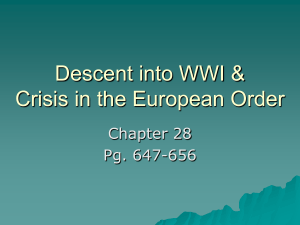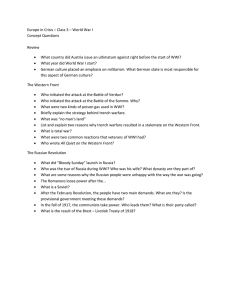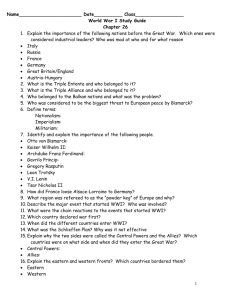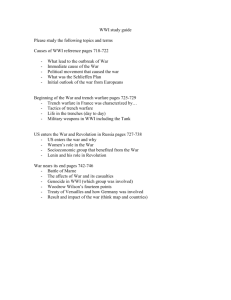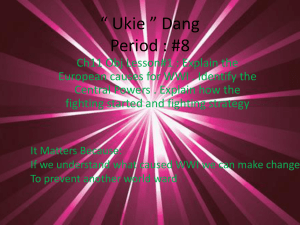World War I 1914-1918 1
advertisement
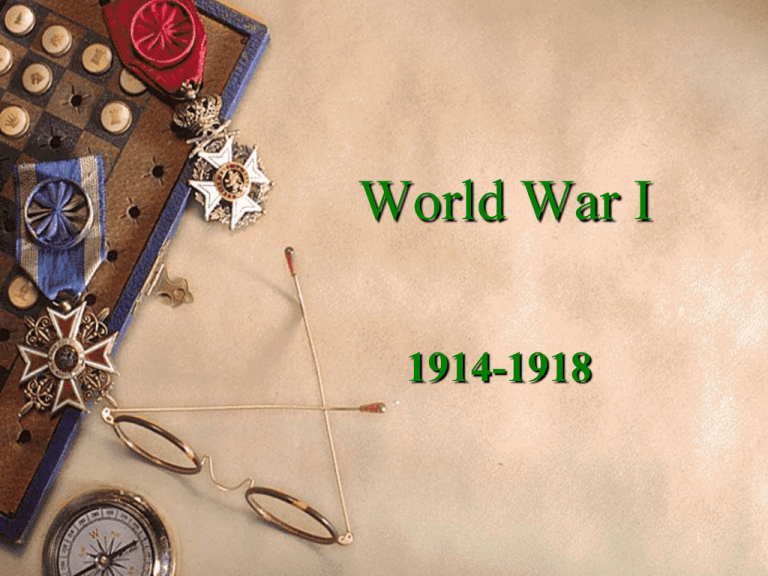
World War I 1914-1918 1 Which of the following took place from 1914 to 1918? – A The Great Depression – B World War I – C The Populist movement – D The Spanish-American War 2 The roots of WWI go back to the 1860s, when Prussia began a series of wars to unite all the German states. – By 1871 Germany was united • The new German nation changed European politics & the balance of power in Europe 3 CAUSES: NATIONALISM IMPERIALISM ALLIANCES MILITARISM 4 According to the map, which nations were allies during World War I? – A France and Spain – B Germany and Bulgaria – C Greece and Sweden – D Norway and Portugal 5 Conflict: Serbia—Austria-Hungary – Fighting over land/borders Russia had interests in this land also – Access to the Mediterranean Germany was also interested in this land – Wanted to rail link w/the Ottoman Empire 6 1- Assassination of Franz Ferdinand, (heir to the A-H throne) 1914 by Serbian terrorist Gavrilo Princip, in Sarajevo, capital of modern day Bosnia Motive: NATIONALISM 7 8 9 2 – War Declared: July 28, 1914, A-H declares war on Serbia Russia immediately prepares for battle (Remember, they are Serbia’s ally) 10 3 – Countries at war: All the nations in Europe had been expecting war – They made treaties & formed alliances 11 Central Powers (Triple Alliance) Germany, A-H, Italy Bulgaria, Ottoman Empire (modern day Turkey) Allied Powers (Triple Entente) Russia, GB, France, US 12 13 The system of alliances trapped countries into a chain reaction – All the major powers had war plans for quick victories… • But NO plans for a long war! –The Germans thought they would be home by Christmas 14 Schlieffen Plan German plan to knock France out of the war & then concentrate on Russia – 1st, Germany defeats France • In the west – Then they attack Russia • In the east 15 Germany advances through France w/little resistance – Until Russia attacks in the east – This forces Germany to send some of its troops to the eastern front – German troops are split in half 16 This weakened the Germans – Allows Allies to regroup ***Germany comes w/in 30 miles of Paris – Battle becomes a stalemate • Trench Warfare 17 What does America do? US wants to remain neutral – It’s a foreign war • European War It was hard to remain neutral – Large # of German & Irish immigrants in the US Most Americans favored the Allies – Close links to Britain – Links to France • Remember the Revolutionary War? 18 19 G.B. tries to win support from US G.B. uses Propaganda: – Info designed to influence opinion • What is a modern day example of propaganda? 20 21 22 TRENCH WARFARE Causes of WWI Worksheet MUST BE COMPLETE I will not accept worksheets that are partially finished 23 WHAT MAKES THIS WAR DIFFERENT FROM PREVIOUS ONES? 24 Trench Warfare – most of WWI was fought in narrow trenches designed to shield soldiers from enemy artillery First 4 mo. of war 1½+ million soldiers were killed or wounded. 25 26 27 28 29 30 Soldiers dug a vast network of trenches across France – Sand bags protected the tops; floors were covered with planks (boards) – Soldiers on both sides dug about 6,250 miles of trench in France 31 32 Trenches: 6-8 ft. deep – 25 yards - mile apart – Despite all the work, soldiers spent much of the year soaked and covered with mud 33 Between opposing lines . . . “no man’s land” • Barbed wire • Corpses • Guns • Machine gun shells • Mud • Torn earth • Shattered trees 34 35 4 –Technological Advances: a) Submarines: • GB employs a naval blockade on Germany • GB would not let any ship in or out • Became an important strategy in the war • Germany had trouble importing food • 750,000 Germans starve to death • To get around the blockade Germany used u-boats • Underwater boat 36 Later u-boats were equipped to lay underwater mine fields ***Germany used unrestricted submarine warfare – Attack any ship • Military or civilian 37 Which of the following actions by Germany led to the end of U.S. neutrality during World War I? – A The invasion of Russia – B The use of unrestricted submarine warfare – C Attacks on U.S. colonies – D The assassination of Archduke Franz Ferdinand 38 39 French sub 40 Allied vessels had no reliable way of detecting u-boats – By 1918, u-boats had sunk 11+ million tons of shipping. Had Germany been able to employ more subs, G.B. could have easily lost the war 41 b.) Chemical & Biological warfare: Germany used several poisonous gases in the war: – Mustard gas & Chlorine 42 The intentional wartime use of chemicals, bacteria, viruses, & toxins/poisons to incapacitate, seriously injure, or kill soldiers or civilians is called chemical & biological warfare 43 44 • Like nuclear weapons, biological/chemical weapons produce civilian casualties & other secondary effects when the toxic agents drift away from the battlefield • Their control & regulation have prompted international concern 45 c) Machine guns • Armies employed a variety of improved machine guns *** Rapid-fire machine guns led to trench warfare • Machine guns could fire up to 600 rounds per minute • 10 rounds a second 46 47 d) Tanks: • GB developed (in secret) an armored vehicle • Very slow & unreliable 48 e) Airplane: • Were 1st used to observe enemy activities • War in the air 49 • Sinking of the Lusitania • British passenger liner carrying civilians • May 1, 1915 50 • Zimmerman Telegram • Intercepted by the British • January 1917 • German proposal to Mexico: • Become allies • Regain lost from territory US • Texas • New Mexico • Arizona 51 Which of the following most influenced President Woodrow Wilson’s decision to ask for a declaration of war against Germany? – A The assassination of Archduke Franz Ferdinand – B Germany’s treatment of prisoners of war – C The German use of aerial bombing raids – D The Zimmermann telegram 52 Which war is described by the information above? – A Spanish-American War – B World War I – C World War II – D Korean conflict 53 Get out a sheet of paper 1. List the 4 causes of WW I 2. What brings the US into WW I? 3. German submarines are called _______. 4. How did GB try to gain US support? 5. What is “no man’s land”? 54 WWI & the Home Front 55 5 – US declares war – April 6, 1917 Congress passes the Selective Service Act: – Requires men to register w/ the gov’t for random military service – www.sss.gov 56 The Home Front US is desperate for soldiers Draft: – Forced military service – Conscription African-Americans: Encouraged to join the Army – Encountered discrimination & prejudice in the service – Fought under French command 57 369th Infantry Croix de Guerre 58 59 Women: – Served as nurses & clerks 60 Fuel: – To conserve energy, the Fuel Administration introduced daylight savings time • March 1918 Food: – Americans were encouraged to plant Victory Gardens • Grow their own food 61 62 Americans were encouraged to give up certain goods & have: – Gasless Sundays – Wheatless Mondays – Meatless Tuesdays – Porkless Thursdays 63 64 65 The point of view expressed in this poster is that if Americans failed to support the war effort by purchasing government bonds, then — – F freedom would be threatened – G the government would increase rationing – H more soldiers would have to be drafted – J the United States would be expelled from the Allied powers 66 “Great Migration” European immigration has stopped & many white workers are drafted – This leads to a shortage in workers This enables 1,000’s of AfricanAmericans to move north – High wages/plentiful jobs 67 Between 1917-1920 over 100,000 Mexicans head north • Migrate to SW US –Texas, NM, Arizona & California 68 American troops aid the Allies – Boosted morale because they were fresh – US have not been fighting for 2+ years 69 6 – Russia withdraws from the war in Spring 1918 ***Russian Revolution – Communists control country ***Russia loses substantial territory – More than any other country 70 71 7 – Collapse of Germany: • Homefront is destroyed • Shortages of food, medicine, weapons • Morale 72 Late Sept. Germans urged their gov’t to end the war Germany’s position worsened: – A-H & Ottoman Empire surrender – Germany has no other choice… 73 Oct. 3, German rulers request an armistice: – cease fire – end fighting • Nov 11 – Germans sign armistice Jan, 1919, Pres. Wilson gives a speech: – 14 points speech – Based on “the principle of justice to all peoples & nationalities” – Abolish secret agreements between nations – Guarantee freedom of the seas – Approve the League of Nations 74 1) No more secret treaties 2) Countries must reduce their weapons & their armed forces 3) National self-determination should allow people of the same nationality to govern themselves & one nationality should not have the power to govern another 4) All countries should belong to the League of Nations 75 The three points listed above support President Wilson’s belief that the Fourteen Points were — – F arranged by private negotiations – G important to the United States’ supremacy – H necessary to prevent future wars – J reasons for punishing Germany 76 77 8 – Terms of the Armistice: German fleet goes to Allies, including all military supplies • 5,000 cannon • 25,000 machine guns • 5,000 locomotives –150,000 railroad cars 78 79 June 1919: Treaty of Versailles: 1 – forced Germany to accept full responsibility for the war 2 – stripped Germany of its colonies, coal fields, & provinces 80 3 – reduced Germanys army & navy 4 – forced Germany to pay $33 billion in reparations *compensation *reimbursement 81 The debt was to be paid over 37 years with a 6% interest rate – Annual payments = 2 billion gold marks plus 26% of all German exports The British calculated that this was 3 times what Germany could actually afford to pay 82 Germany borrowed heavily during WWI They figured: – A: They could repay the loans at their leisure as victors • OR – B: The countries they defeated would cover their debts Germany begins to default on its payments – France decides to use this as an opportunity to continue to weaken Germany 83 French Occupation of the Ruhr 84 85 German colonies 86 What was the name of the peace settlement that made Germany accept sole responsibility for World War I? – A Treaty of Portsmouth – B Geneva Accords – C Marshall Plan – D Treaty of Versailles 87 New European nations formed: – – – – – Czechoslovakia Yugoslavia Lithuania Latvia Estonia This built resentment & poisoned the international climate – It will spark an even deadlier war 88 9 – Effects/Cost of War: • Millions of lives lost • 22 million • 1/2 were civilian • 20 million wounded • 10 million became refugees • Cost $338 billion • Land, towns, villages destroyed • Wide spread disillusionment; lost generation 89 90 91 92 War, by Otto Dix 93 Flanders, by Otto Dix 94 A Star Shell, by Christopher Richard Wynne Nevinson 95 L'Enfer(Hell), by Georges Leroux 96 10 – Peace & its results League of Nations is formed – Group of nations, est. to prevent another war Does not last • Nationalism remains… 97 Many Americans opposed U.S. membership in the League of Nations out of concern that it would — – A place a financial burden on U.S. taxpayers – B lead to U.S. involvement in international conflicts without congressional approval – C expand the power of the president on domestic issues – D prohibit the United States from annexing additional territory 98 99 100 Balfour Declaration of 1917 (November 2 1917) – was a formal statement of policy by the British government stating that "His Majesty's government view with favour the establishment in Palestine of a national home for the Jewish people, and will use their best endeavors to facilitate the achievement of this object, it being clearly understood that nothing shall be done which may prejudice the civil and religious rights of existing non-Jewish communities in Palestine, or the rights and political status enjoyed by Jews in any other country." 101 Instructions 1. Write summary 2. Finish TAKS WWI 3. Complete timeline of WWI – 10 events – Chronological – Illustrated – Color – Inc. dates Extra Credit – Create a WWI Propaganda poster 102 103 Get out a piece of paper 1. What was the treaty that ended WW I? 2. What was the “Great Migration”? 3. Americans were encouraged to plant _____. 4. Why did Russia withdraw from WW I? 5. What brings the US into WW I? 104 105 106 107 108
